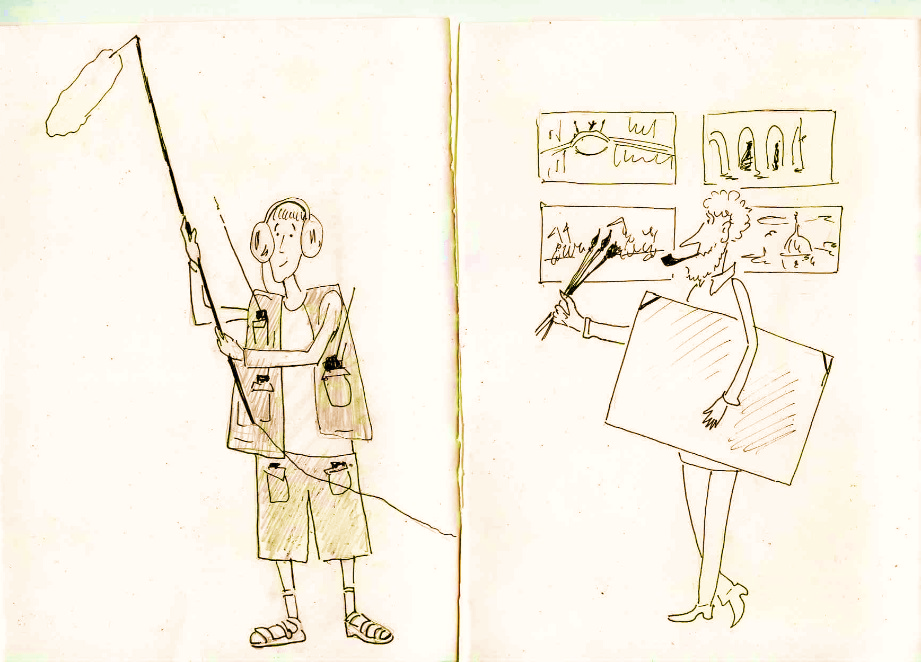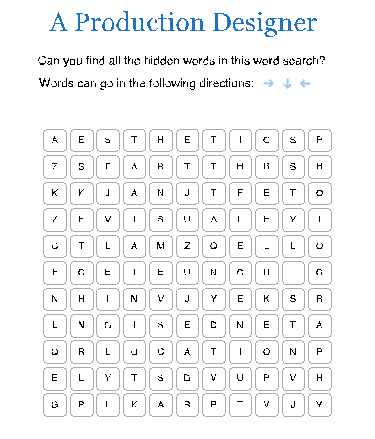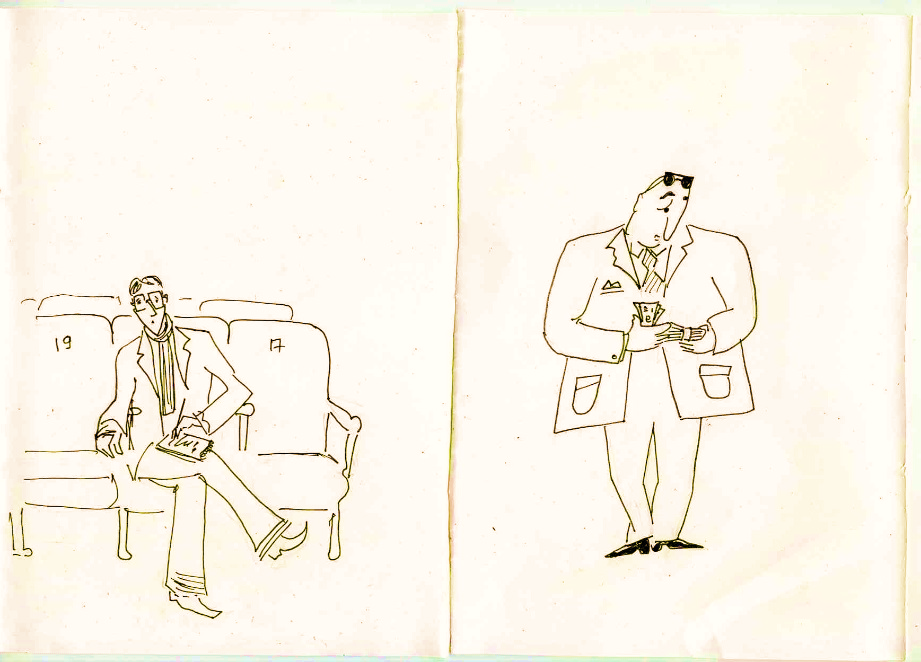ВУЗ: Не указан
Категория: Не указан
Дисциплина: Не указана
Добавлен: 06.09.2024
Просмотров: 128
Скачиваний: 0
A Production Designer
A
production designer is a person who works to create and establish the
aesthetics of a production. These professionals may be responsible
for developing the design for films, television (TV) programs, music
videos or advertisements. Production designers might also be referred
to as “art designers”, because key responsibilities of the
positions can be similar or shared. 
Usually, a production designer is charged with the task of establishing the setting and style of a motion picture, including the overall design of sets. Before beginning a project, production designers might take time to create a design concept, which will influence subsequent decisions regarding the production’s design. In certain situations, production designers might collaborate with directors when creating the concept. Regardless of whether the director’s input is honored, the design concept will be used by art staff members to make production choices and create visuals. Sketches or conceptual models might illustrate the design concept and help staff members better understand and follow the concepts.
Production designers are expected to work in a collaborative capacity with those individuals above and below their positions in the project’s hierarchy. For example, a production designer might confer with producers, directors and directors of photography to decide on a feel of a film while also working with set designers, set decorators, set dressers, property masters, graphic designers, model makers, costume designers and others to make their vision a reality. Production designers might also direct the locations manager, the hair and makeup stylists and the special effects director to ensure that all elements of a film are organized and tied together.
The ultimate responsibilities of a production designer can vary between projects and industries. In some productions, the production designer is almost wholly responsible for the project’s aesthetics. In other productions, a production designer’s responsibilities are reduced. Typically, production designers whose tasks are limited are often working under a director with established visual styles.
Those interested in pursuing a career in production design should have a working knowledge of the fundamentals of design. Students interested in pursuing production design might major in architecture, environmental design or theatrical set design. It’s also suggested that future production designers develop communication skills, because an integral part of the job is to develop concepts and effectively communicate them to everyone from producers to production staff members. Graduates looking to begin a career in production design should consider becoming a production assistant for practical training. New graduates might seek job opportunities in student films, commercials or low-budget music videos.
SUMMARY
The production designer, or the art director, is one of the key figures in film production. He determines the look of films, TV programmes, music videos or advertisements. He is responsible for the décor and style of a picture, including the design of sets.
Before beginning a project, the production designer sometimes creates a design concept, which influences later decisions. The design concept helps art staff to make production decisions and create visuals.
The production designer works closely with the producer, director and director of photography to tell the story visually. He supervises set designers, set decorators, set dressers, property masters, graphic designers, model makers, costume designers and others. The production designer also collaborates with the location manager, hair stylists, makeup stylists and the special effects director to make sure that all elements of a film are well organized.
It goes without saying that production designers should know the basics of design. Good people skills are very important too, because they need to communicate with other production unit members and explain to them their ideas.
If you start your career as a production assistant, it can do you a lot of good. You can also look for a job in student films, commercials or low-budget music videos to get practical experience.
Exercise 64. True, False or Not Stated?
The production designer and the art director are different jobs.
The production designer determines the visual side of the production.
The production designer always creates a design concept.
The production designer should always work in partnership with the film director.
The production designer oversees editing.
The production designer is always fullу responsible for the aesthetics of the film.
The location manager helps the production designer to create visuals.
Exercise 65. Make a heading for each paragraph.
Exercise 66. Find words related to production design and make sentences with them.
Exercise 67. Solve the puzzle.

Exercise 68. With your partner, discuss pros and cons of being a production designer.
Exercise 69. Read the article “What is a Movie Critic?”
а) Before reading discuss the following questions:
There is a popular stance that a critic is a person who cannot do what he criticizes or reviews. To what extent do you agree with that?
Can a movie critic be of any help to other filmmakers?
Do you read reviews before going to the cinema? Why?
b) Read the article and make sure you know all the highlighted words.
What is a Movie Critic?
A professional movie critic may sound like a dream job. It is true that a movie critic does get paid for watching movies every week, but that’s only part of the actual job. The product may look promising on the surface, but a movie critic’s role is to give an honest assessment before the release of the movie to a general audience. A movie critic bases his assessment of a film on a number of elements, including the work of the director, the level of acting, the casting, the faithfulness to source materials, the editing and the quality of the screenwriting.
A
movie critic may not like horror films, for example, but he or she
should be able to
tell the difference between
a good or bad
slasher
film. Most movie critics understand that their personal opinions
influence
potential ticket buyers, so they make
an effort to
offer both the pros and cons of the films they review.
Criticizing a movie professionally is not simply a matter of voting yes or no on a new movie release. Sometimes a professional movie critic may have to do a great amount of research in order to put the movie in a proper context. A very complex movie may need criticism on psychological, dramatic and sociological levels, which means a movie critic also has to have very strong analytical and literary skills. Movie critics such as Pauline Kael and Roger Ebert are well known for their in-depth critiques of iconic motion pictures, as well as the directors, screenwriters and actors.
The working conditions for a professional movie critic can be challenging. Watching several films in a single day can be physically and mentally difficult, especially when the critic also has other obligations such as television and radio interviews, newspaper deadlines and personal appearances at film festivals. A professional movie critic can often become just as famous as the filmmakers themselves.
A film critic watches new films and writes critiques about the various aspects of the film, from the acting to the pacing; from the plot to the chemistry between characters. Once the film critic makes an interpretation of the film, he or she must write a well-worded and honest assessment that will be published in one or more publications. Some critics write only for one specific magazine or newspaper, while others write for more than one outlet. A film critic may also present his or her film assessment on a website, television programme, or trade publication.
Becoming a film critic is not as glamorous or easy as it sounds. A critic must know many, if not all, aspects of films and film production. Some critics have college degrees in film studies. Other critics may have training in literature. Some critics are simply film fans.
Writing skills are essential for a film critic. The critic often has to view several movies a day, take notes and write an accurate review of specific scenes in the movie. Critics often must meet strict deadlines for several publications, and the process can be mentally challenging. They should keep a clear head while they are watching a film and maintain objectivity especially when the film critic must write a review of a movie that features a writer, director, or actor he or she does not particularly like. It can sometimes be quite difficult or impossible.
There are a lot of media outlets. Websites are one of the most common outlets for film critics, and while written articles are very commonly published on websites, audio clips and short video clips also present one of the strongest review methods. These days a film critic must know different methods of delivering their materials and be willing and able to reach audiences in all the ways possible.
The life of a film critic is full of duties and responsibilities. As a film critic, you have to answer burning questions such as the following:
How do you decide which movie to review?
What is your literary approach or reviewer approach to the film you are going to write about?
What are you going to do to protect yourself from other critics’ influence without compromising your own review of the film?
How do you influence your readers as you review films?
How do you identify yourself as a film critic amidst a great number of film critics?
c) True, False or Not Stated?
Every filmmaker wants to be a film critic.
Horror films are not very popular with film critics.
Some critics realize that what they say affects buying tickets.
Film critics always post their comments on the Internet.
In their reviews, film critics try to cover every aspect of filmmaking.
There are critics who majored in film studies.
Having writing skills is very important for a film critic.
Film critics read a lot of contemporary books.
d) Follow-up discussion: Go to www.imdb.com, choose a film and read its reviews. Do you agree with them? Write your own review and post in on the site.
Exercise 70. What skills must one have to be a good actor / script writer / film director / producer / sound designer / production designer/ DP / film critic?
To be a good … one must / should be able to …
Exercise 71. Match the words to make word partnerships.
|
|
Exercise 72. Match the words and definitions.
|
extra sequel stunt nominate box office star |
critic scene part frame audition |
Someone whose job is to review films for a newspaper or TV programme…………
A role/character played by an actor/actress……….
A second film made to continue the story started in the first………
The most important or the most famous actor / actress in a film………
A risky piece of action, which a professional does instead of an actor ……,….
A shot or series of shots in a movie in which events happen in the same place or period of time ……………
A single picture on a roll of movie film or videotape ……….
Select to be on a short list for a prize ……….
A short performance by an actor, dancer, or musician, to demonstrate their skill……….
A performer who plays in a crowd scene in a film ………..
A place at the cinema where tickets are sold………
Exercise 73. Cross out the word, which does not normally go with the key word.
A) advertising skills
award
communication
people
technical
analytical
B) the first print
the final
the middle
C) make a plan
fulfill
desire
D) needless to say
nicely
a sweet thing
E) launch a project
finish
introduce
do
make
F) hunt for
look
search
launch
G) meet the deadline
go
miss
strict
Exercise 74. a) Use a dictionary to find synonyms to the following words.
topical (adj.)
numerous (adj.)
launch (v.)
synopsis (n.)
sophisticated (adj.)
skilful (adj.)
major (adj.)
responsibility (n.)
requirement (n.)
present (adj.)
b) Use a dictionary to find antonyms to the following words.
leading (adj.)
protagonist (n.)
remarkable (adj.)
short-length (adj.)
silent film
various (adj.)
independent (adj.)
high-quality (adj.)
hard-working (adj.)
flexible (adj.)
experienced (adj.)